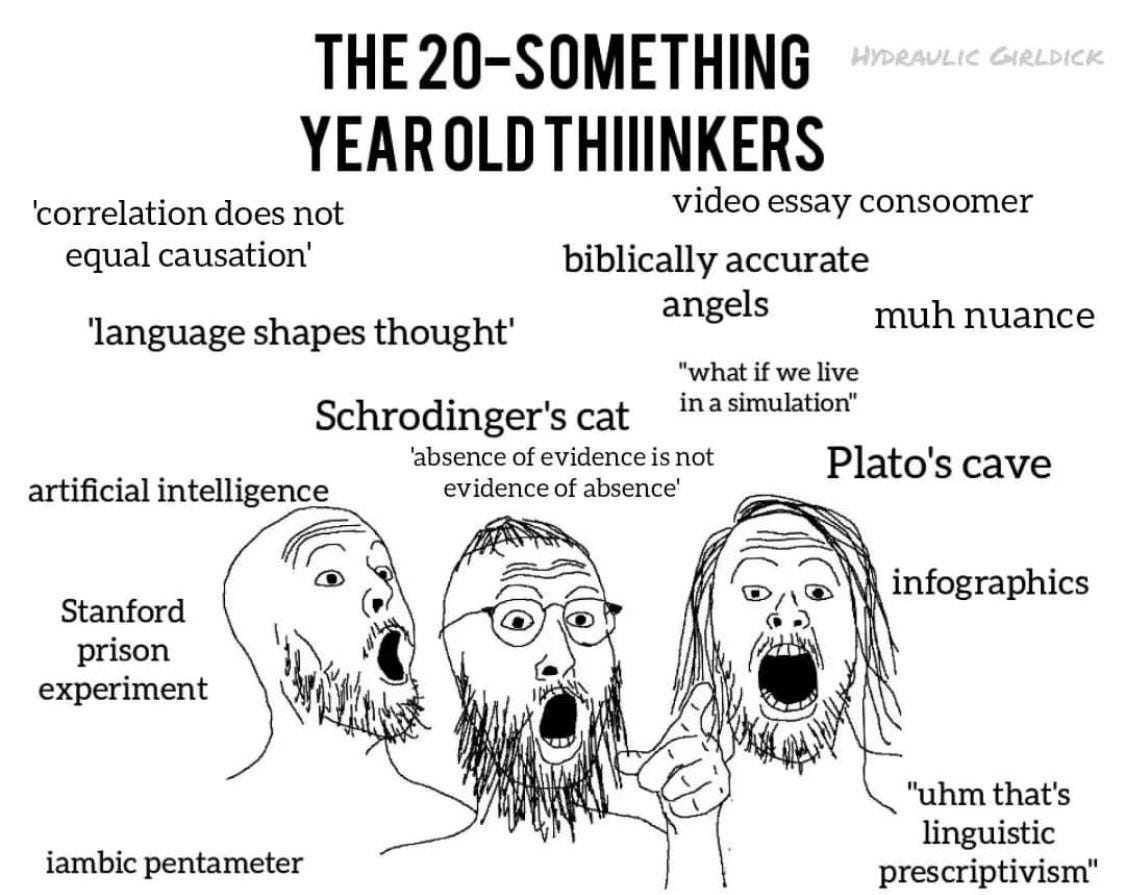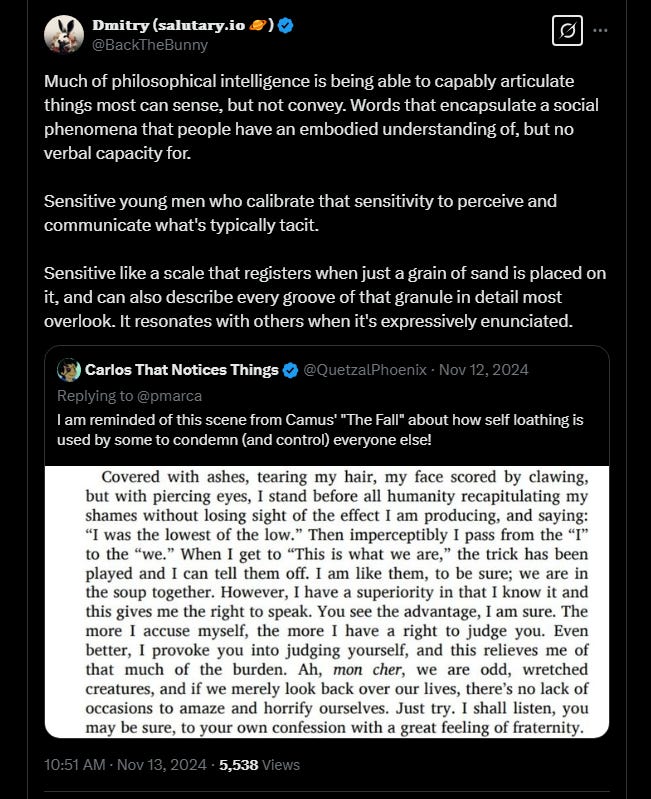I occasionally get remarks that a philosopher would agree with something I’ve said or has made observations similar to my own. It happened yesterday in the comments to a post (apparently Hobbes agrees). Off the top of my head, I’ve been told I’m broadly Machiavellian, that Nietzsche would approve of this essay, and Bastiat would endorse this one. I haven’t read them.
It may surprise to know I’ve never read any philosopher; I honestly can’t recall reading a single page. I’ve been exposed to a handful from scrolling the timeline, but that’s the extent of my philosophy education.
My avoiding them is a two-part decision.
Aesthetic side note: I listened to this modified song on loop while writing this piece.
Nietzsche Speaks of This
I was turned off to philosophers at a young age. I kept seeing people leverage them as a smart-by-association “Hegel speaks of this, Kant concurs” form of intellectual stolen valor. As if name-dropping a guy’s interpretation of the world was a way to score status points. I don’t care what he thinks, what do YOU think? Or do you?
Not only does this not warrant any big-brain credits, but acting as a conduit for the ideas and musings of others makes me infer you don’t have many of your own. Being an avatar for someone else’s opinions is not a personality. It always struck me as weird to quasi brag about serving as a node for another man’s output; I view this as antithetical to intellectualism, yet it’s typically perceived as synonymous with it.
What you ethically and cerebrally sincerely subscribe to should stand on its merits, buttressed by your own defenses. When I see a philosopher referenced, I can’t help but sense an unintentional outsourcing of cognitive load-bearing activity so you can hand out a clever-looking pastiche of what he said. In its worst manifestations, it’s an Appeal to Authority-esque “I don’t know why I think this, but this guy did so… checkmate!” that severely rubs me the wrong way.
It’s possible for people to use a thinker’s ideas as points of departure, crafting a unique vantage that’s not a simulacrum. I just… don’t recall seeing that happen very often.
It didn’t appear like people sharing their own thoughts in pursuit of enhancing another’s worldview, it felt like a pissing contest. “If you would please consult Heidegger on these matters, you will see your folly is… most follyful.”
Philosophy in practice reeked of cognitive insecurity, like a display put on for the speaker’s intellectual vanity, peacocking beliefs that weren’t even his! He just picked them out of the academic grocery store, grabbing a box of cereal off the philosophy shelf and saying, “This is good. I like it. This is mine now. I am now a staunch proponent of the Cinnamon Toast Crunch school of epistemology”.
If you’re going to flaunt it, at least get there on your own man. You cannot borrow philosophical truths, you must earn them. We all stand on the shoulders of giants, however you still must move your legs, you must add something; you can’t just sit on his shoulders and call yourself tall.
I saw the exchanges as existing to impress those I had no desire to impress.
The vibes I’m referring to are as follows:
My initial aversion to formal philosophy is a result of these observations, formed in my early 20s. However I still avoid philosophers to this day and it’s no longer predicated on their adherents’ smuggery.
There's a strange tension in critiquing philosophy while simultaneously frequently engaging in it myself. This is not lost on me. If you’re going to call me a hypocrite, please keep in mind that I contain multitudes (common philosopher trait).
Second-Hand Scars
Some answers can be handed to you, such as facts that let you pass a right/wrong test. Math, chemistry, accounting, medicine. Objective domains. If the LLM can cleanly answer it, it probably fits into this bucket. Dmitry speaks of thi… excuse me I speak of this in Trashbags of Facts and Insipid Oceans.
However there are answers you should not be handed, as they can’t be sufficiently “handed over” anyways, because they’re not actually answers, they’re phenomenological and existential scars. This is what unfeigned philosophy is. “You know how I got these scars…” is the effective prelude to a genuine philosophical accounting.
The following image compared to the ones above juxtaposes the status-seeking pseudo-insights that litter discourse with what an authentic exposition resembles. It’s raw. Like porn: you can’t define it, but you know it when you see it.
An act of philosophy unveils a harsh reality most have evolved to not notice, by design. It’s when the human mind is exposed to nature’s axioms in jarring fashion. It almost necessarily involves a tragic journey. Suffering is essentially a prerequisite for producing something viscerally profound.
You cannot absorb the lessons of such a journey without embarking on it yourself. Muscles do not grow without weight-bearing stress; sentience does not expand and mature without soul-straining distress.
There are no shortcuts, this includes books. You can’t inherit scars, you earn them. Philosophy is tracing around the disfigurement left on your skin.
Truth in Different Shapes
There are three kinds of truths:
A scientific truth is one that’s technically true.
A Darwinian truth is one that’s technically false, but if you act like it’s true it aids survival.
Example: a porcupine throws its quills. This is scientifically wrong, but it’s useful because the behavior results in an action positive for survival (you avoid the porcupine under false pretenses and don’t get pricked). Grandmas are chock full of Darwinian wisdom (don’t go outside when it’s cold… or you’ll catch a cold!).
Most religious stories are civilizational Darwinian truths. Nature does not do coincidences at scale. Religion is a human universal for a reason: it’s beneficial for societal coordination and cohesion that we collectively convene on certain behaviors as “true”, independent of the concrete veracity of the story motivating it. Assessing religions on scientific grounds is silly; they are not scientific instruments, they are evolutionary ones.
A philosophical truth is an unforgiving confrontation with the nature of reality that alters your navigation of the world. Whether this manifests in healthier behavior is… to be determined.
This is what I mean when I say most have not evolved to assimilate philosophical base truths; there is diminishing Darwinian utility to sentience after a certain degree. The species is not made better off if we become too conscious. Pathological sentience, otherwise known as nihilism, is harmful. NPCs exist for a reason; nature does not do coincidences at scale.
Muscles are metabolically expensive, and sentience is cognitively burdensome; there are decreasing, and eventually negative, returns to each.
Philosophical truths can be scientific, Darwinian, both, or neither. There are kinds you are better off not knowing.
Describing a Symphony
Men wear their realizations on their face. Hard-gained wisdom seeps out of their demeanors. You couldn’t hide it if you tried. It’s apparent when someone does not carry the weight of their own insights; it’s how you can tell they did not gain them via journey, but borrowed them via book.
The scars of another can be regurgitated. Memorized. Cited passively to earn debate points. But they are inherently not tidbits of academic information; they are often personal burdens, unkind revelations, deeply intimate epiphanies, emotional wounds… a lesson that must (emphasis: must) be experienced to be properly absorbed and internalized.
If you read and nod in agreement but didn’t get there on your own, it’s tantamount to reading a description of a symphony. Or a written summary on a piece of art. You did not hear it. You did not view it. There’s only so much you can apprehend without bearing witness to them. Experience is the essence of philosophical growth.
You can parrot what you’ve been told the symphony resembles, but you will never appreciate the depth, beauty, pain, and knowledge that went along with its discovery based on recapitulation. Some lessons must be experienced. To me, this is what unalloyed philosophy is: people reciting their symphonies. Pseudo-philosophy is when you describe the symphony of someone else.
When I saw this scene as a kid, maybe around eight years old, it grabbed me and never let go.
First-hand scars vs second-hand scars:
Life Road Trips
Getting to uncomfortable truths is part of life’s road trip. You need to see the sights, hear the sounds, and think the thoughts for it to be properly appreciated. You don’t borrow the pictures of others, you take your own shots. The point of a road trip isn’t the destination.
Philosophy is fundamentally a library of incredibly sensitive (in the good way), introspective, contemplative, perceptive people documenting their life road trips. What they’ve reaped and felt, been painfully subjected to, realities they’ve encountered. Their experiential pilgrimage informs their contemplative output.
Is their excursion relevant to you? I don’t know, did you take the same road? In the same car? Same weather? At the same speed? Are you as good a driver? Did you break down in the same ways at the same spots? Are you one for detours?
The essence of philosophy is an autobiographical compendium of a man’s most salient detours.
You cannot simply copy and recite these things. They will never be yours.
Philosophy of a Fist
My approach to the great pensive tradition does not scale and is likely counterproductive for most. The lived road trips of many are devoid of experiential substance and they're improved by living vicariously through another.
Advanced society would be worse off if everyone viewed philosophy the way I do, as it’s better to have a verbal understanding (answers that lets you pass a test) of someone else’s trials and tribulations than none at all.
The “get there through doing” method of philosophy yields an embodied understanding: wisdom that resides not solely in your mind, but your bones. This results in an internalized, intuitive grasp of a concept by virtue of it being revealed to you, not given to you. You don’t forget (and also cherish) the stuff you have to earn.
Reading the symphonies of others doesn’t allow you to comprehend something in an embodied, integrated way; it only yields nominal awareness. Do people that read baby books but don’t have babies fathom what it means to be a parent? Philosophy degrees with no substantive personal road trips strike me as analogous to reading “What to Expect When You’re Expecting”, never having children, and then lecturing about what it’s like having kids and being a mom. Peddling a second-hand description of a symphony.
You can watch Jon Jones fight, mimic his techniques, study his mannerisms. Yet embedded in those superficially reproducible moves are decades of ingrained instructions and methods he cultivated through combat.
You must get punched in the face and brutalized to develop the reactions and embodied relationship with violence that a fighter has. You must learn to use your elbows by taking ones yourself, then reciprocating. Repeatedly. You cannot just study it or watch MMA on TV. There are shortcuts to passing tests, not for muscles and sentience; they both require stress to cultivate. Hormesis applies to much of life.
Applied philosophical acumen does not come from studying other’s getting punched, it comes from taking punches. Degrees in Punching Studies are no substitute.
A Stubborn Symphonic Conclusion
I prefer to take my own pictures, earn my own bumps and bruises, describe the scenic overlooks myself, and drive life’s Route 66 without a map. The map is rarely the terrain, anyways. To document my own symphony, I don’t want to be primed or prompted. Call it stubbornness and high disagreeableness (it definitely has a lot to do with this), but I hope I’m better for it. Again, I’m aware this does not scale.
I suspect (hope) people can sense how my reasoning and breakdowns are conclusions I arrived at through personal mental detours. Fleshed out in my articulation and defense. There’s a journey in there, you can’t fake that. So, for better or worse, you are witnessing the output of a guy who is trying to drive without borrowed directions.
This explanation for why I avoid philosophers feels correct to me, however I don’t know for certain that it is. For being such a curious guy, and with a strong penchant to gaze into the abyss (even without reading Nietzsche you can’t help but know that one), it’s odd I want nothing to do with philosophers.
It started out intentional, but has grown into a complete lack of interest. Only recently have I reflected on why.
I know many of you read and enjoy philosophy, so don’t take this as a slight or anything remotely resembling a personal criticism. I know I’m the weird one here. This is simply an honest reflection brought about from remarks noting how my thoughts converge with someone else’s.
I always smile when told a guy before me “speaks of this”. It’s nice knowing another fella with similar temperament and sensitivities once drove down the same highway as you. Fellow traveler’s discussing their pitstops.
Subscribes and shares are very much appreciated. If you enjoyed the essay, give it a like.
You can show your appreciation by becoming a paid subscriber, or by donating here: 0x9C828E8EeCe7a339bBe90A44bB096b20a4F1BE2B
I’m building something interesting, visit Salutary.io
Related essays (in addition to the ones already linked):
The Volatility Tax Must Be Paid
Man innately hates volatility. We're evolved to fear losing money more than making it. We dread being fired more than being stuck in an endless corporate loop of mediocrity. We try to suppress the variability that’s necessary to keep life fresh by fearing volatility, the unknown, so we can take comfort in the predictable; even if the predictable is stul…
Touching Soul, Touching Senses: The Art You Deserve
Art does not breed culture; culture breeds art. Culture does not inform an environment; an environment informs a culture. The animals at the bottom of the ocean didn’t create that pressure; that pressure created them. The environment dictates the expression.










![Everyone has a plan until they get punched in the mouth." - Mike Tyson [750×400] : r/QuotesPorn Everyone has a plan until they get punched in the mouth." - Mike Tyson [750×400] : r/QuotesPorn](https://substackcdn.com/image/fetch/w_1456,c_limit,f_auto,q_auto:good,fl_progressive:steep/https%3A%2F%2Fsubstack-post-media.s3.amazonaws.com%2Fpublic%2Fimages%2F11070213-813b-43d8-b288-702a50bde50c_750x400.png)


Jung speaks of this
Tool….good call “right in two…”